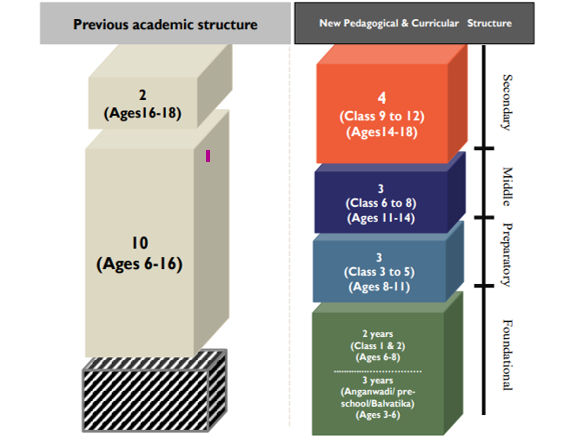In alignment with the National Education Policy 2020, our institution prioritizes practical training and skill development alongside traditional academics. Our short-term certificate courses aim to bridge the skill gap and enhance career prospects for individuals seeking to thrive in today's dynamic job market.
Our short-term certificate courses offer numerous advantages:

| Point of Difference | NEP 2020 | NEP 1986 |
|---|---|---|
| Academic Structure | 5+3+3+4 | 10+2 |
| Vocational Subject | 1 vocational subject is must for classes 6-8 | No such provision |
An Academic Bank of Credit (ABC) will be established. The credits earned by the students can be stored and when the final degree gets completed, those can be counted.
APAAR, which stands for Automated Permanent Academic Account Registry, is a new initiative designed to create a centralized and secure identification system for all students in India. Aligned with the National Education Policy (NEP) 2020 and the National Credit and Qualifications Framework (NCrF), APAAR aims to: Simplify student record management, Enhance transparency, and Promote lifelong learning Student Registration Click Here.
ASDC is developing credit-based 60 hrs skill-based qualifications on the below technologies which can be offered to students as elective courses:

Additive Manufacturing
(3D Printing)

Automation and
Robotics

CAD/ CAM/
CAE

Cyber security

Smart Manufacturing

Data Science

IIOT

Electric Vehicle
technology

Electric Vehicle Battery
Swapping

Flex Fuel
Engine

Design Safety

Automotive Technology
ASDC is working on and will be launching new courses on the following topics:
| Designing | 3D Printing | Road Safety | EV (Electric Vehicles) |
|---|---|---|---|
| Sensor Technology | Robotics | IIOT (Industrial Internet of Things) |
Awareness session at Educational institutions for taking automobile as career
With support from Industry we can set-up centre at Educational institutions with basic
equipment's an they
can have knowledge OR
Linit of Educational institutions with nearby ASDC training
centre
Training of trainer program for Educational Institutions teachers or professors
Development of course for Educational institutions students of apprce. 15 hrs on traditional or future technology for school and 60 hrs for college students
Industry visit for students for making automobile as career aspirational
We can conduct skill based assessment for Educational institutions.
We also support in placement of students
An industry-led internship provides students with hands-on experience and practical skills by working directly within a company, bridging the gap between academic knowledge and real-world application.
Our courses are designed for individuals who have completed Class 12 (or equivalent) and are eager to pursue higher education or kick start their careers with a strong foundation in practical skills and knowledge.
Job Roles Details
| S.NO. | Sub Sector | Occupation | Job Role Name | NSQF Level | Entry Eligiblity | Notional Hours | Credits |
|---|---|---|---|---|---|---|---|
| 1 | Research & Development | Automotive Product Designing | Computer Aided Product Design | 5.5 | Completed 3rd year of UG (In Relevant Trade) or Pursuing 3rd year of UG (In relevant trade) and continuous education or Completed 2nd year diploma after 12th or 12th Grade Pass with 1 year NAC plus 1 year CITS with 1 year of relevant experience or 12th grade pass with 1 year NTC plus 1year NAC/CITS with 2 years of relevant experience or Completed 3-year diploma (after 10th) with 2 Years of relevant experience or 12th Grade pass with 3 Years of relevant experience |
60 | 2 |
| 2 | Research & Development | Automotive Product Designing | Product Reverse Engineering | 5.5 | NSQF-Certificate in Computer Aided Product Design, Level 5.5 |
60 | 2 |
| 3 | Manufacturing | Automotive Product Development | Industrial Robotic System Planning | 5.5 | Completed 3rd year of UG (In Relevant Trade) or Pursuing 3rd year of UG (In relevant trade) and continuous education or Completed 2nd year diploma after 12th or 12th Grade Pass with 1 year NAC plus 1 year CITS with 1 year of relevant experience or 12th grade pass with 1 year NTC plus 1year NAC/CITS with 2 years of relevant experience or Completed 3-year diploma (after 10th) with 2 Years of relevant experience or 12th Grade pass with 3 Years of relevant experience |
60 | 2 |
| 4 | Manufacturing | Automotive Product Development | Industrial Robotic System Integration | 5.5 | NSQF level 5.5 Certificate (Industrial Robotic System Planning) | 60 | 2 |
| 5 | Research & Development | Automotive Product Designing | Connected Vehicle (V2X) Technology | 5.5 | Completed 2nd year of UG (In trades: Manufacturing/Mechanical/Automobile/Electrical/Electronics or
relevant ) with 1.5 years of relevant expereince or Pursuing 3rd year of 3-Years/4-Years UG (In trades: Manufacturing/Mechanical/Automobile/Electrical/Electronics or relevant) and continuous education |
60 | 2 |
| 6 | Manufacturing | Production Engineering | Low Cost Automation in Manufacturing | 5.5 | Completed 2nd year of UG (In trades: Manufacturing/Mechanical/Automobile/Electrical/Electronics or
relevant ) with 1.5 years of relevant expereince or Pursuing 3rd year of UG (In trades: Manufacturing/Mechanical/Automobile/Electrical/Electronics or relevant) and continuous education |
60 | 2 |
| 7 | Manufacturing | Production Engineering | Foundation course in Manufacturing Data Analysis | 5.5 | Completed 2nd year of UG (In trades: Manufacturing/Mechanical/Automobile/Electrical/Electronics or
relevant ) with 1.5 years of relevant expereince or Pursuing 3rd year of UG (In trades: Manufacturing/Mechanical/Automobile/Electrical/Electronics or relevant) and continuous education |
60 | 2 |
| 8 | Manufacturing | Production Engineering | Advanced Manufacturing Data Analysis | 5.5 | NSQF Certificate in Foundation course in Manufacturing Data Analysis, Level-5.5 | 60 | 2 |
| 9 | Manufacturing | Production Engineering | Foundation of IIOT Application in Manufacturing Predictive Maintenance | 5.5 | Completed 2nd year of UG (In trades: Manufacturing/Mechanical/Automobile/Electrical/Electronics or
relevant ) with 1.5 years of relevant expereince or Pursuing 3rd year of UG (In trades: Manufacturing/Mechanical/Automobile/Electrical/Electronics or relevant) and continuous education |
60 | 2 |
| 10 | Manufacturing | Production Engineering | Foundation course in IIOT Application in Cyber Secured Manufacturing | 5.5 | Completed 2nd year of UG (In trades: Manufacturing/Mechanical/Automobile/Electrical/Electronics or
relevant ) with 1.5 years of relevant expereince or Pursuing 3rd year of UG (In trades: Manufacturing/Mechanical/Automobile/Electrical/Electronics or relevant) and continuous education |
60 | 2 |
| 11 | Research & Development | Automotive Product Designing | Foundation Course in Electric Vehicle Battery Pack Design | 5.5 | Completed 2nd year of UG (In trades: Manufacturing/Mechanical/Automobile/Electrical/Electronics or
relevant ) with 1.5 years of relevant expereince or Pursuing 3rd year of UG (In trades: Manufacturing/Mechanical/Automobile/Electrical/Electronics or relevant) and continuous education |
60 | 2 |
| 12 | Research & Development | Automotive Product Designing | Foundation course in Electric Vehicle Power train Design | 5.5 | Completed 2nd year of UG (In trades: Manufacturing/Mechanical/Automobile/Electrical/Electronics or
relevant ) with 1.5 years of relevant expereince or Pursuing 3rd year of UG (In trades: Manufacturing/Mechanical/Automobile/Electrical/Electronics or relevant) and continuous education |
60 | 2 |
| 13 | Research & Development | Automotive Product Designing | Foundation course in Flex Fuel Engine Design | 5.5 | Completed 2nd year of UG (In trades: Manufacturing/Mechanical/Automobile/Electrical/Electronics or
relevant ) with 1.5 years of relevant expereince or Pursuing 3rd year of UG (In trades: Manufacturing/Mechanical/Automobile/Electrical/Electronics or relevant) and continuous education |
60 | 2 |
| 14 | Research & Development | Automotive Product Designing | Foundation course in Automotive Functional Safety Design | 5.5 | Completed 2nd year of UG (In trades: Manufacturing/Mechanical/Automobile/Electrical/Electronics or
relevant ) with 1.5 years of relevant expereince or Pursuing 3rd year of UG (In trades: Manufacturing/Mechanical/Automobile/Electrical/Electronics or relevant) and continuous education |
60 | 2 |
The education institutes need to submit below documents:
Please write to [email protected]
Registration Form- Higher Education